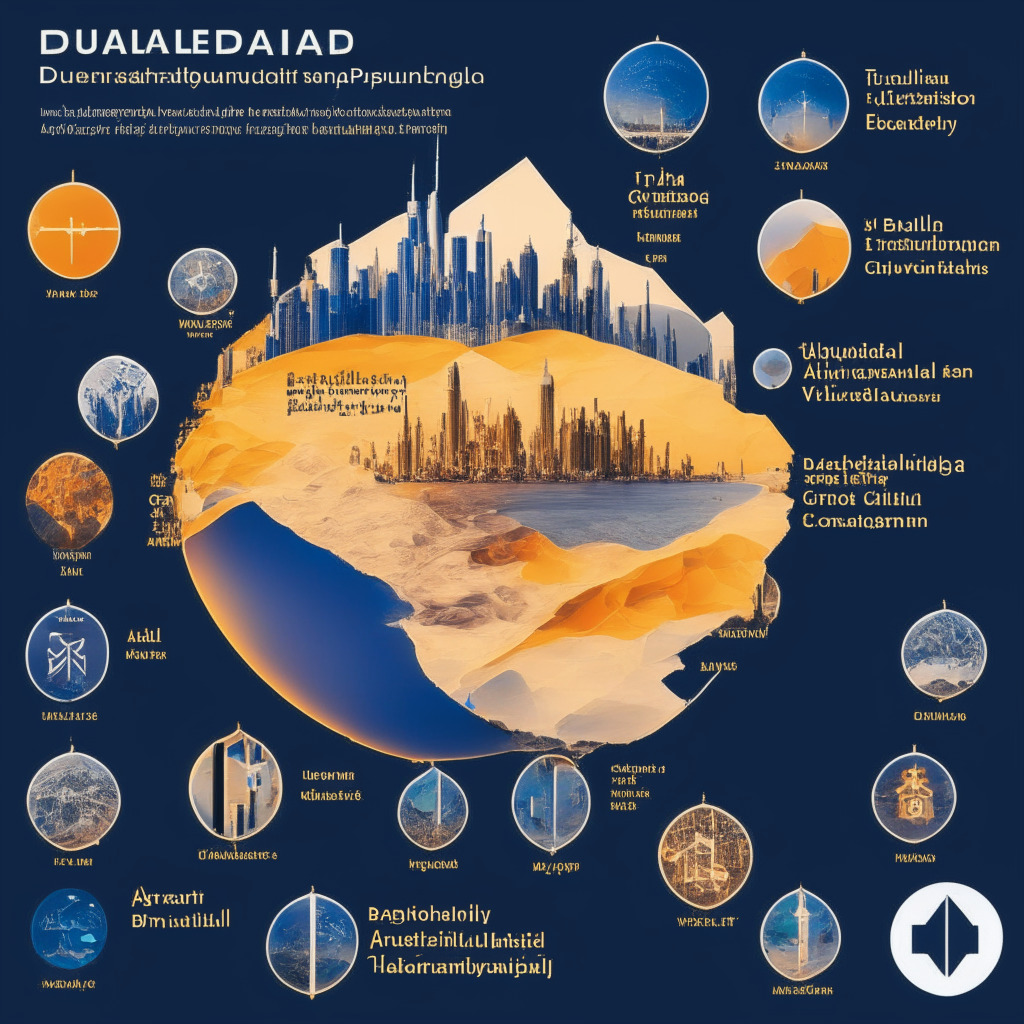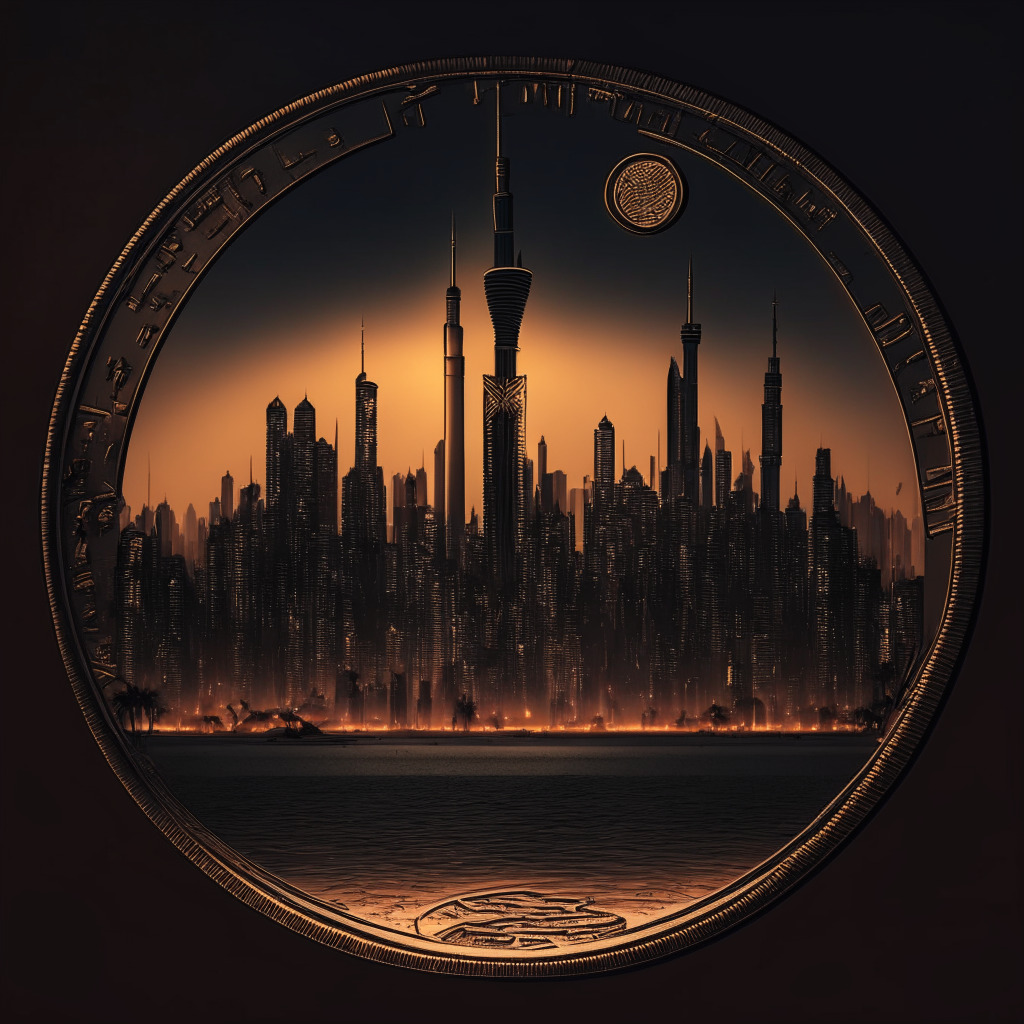The Abu Dhabi-based virtual assets firm, M2, has received financial services permission from the Financial Services Regulatory Authority of the Abu Dhabi Global Market, enabling both retail and institutional clients in the UAE to buy, sell and hold virtual assets like Bitcoin and Ethereum. The M2 platform’s launch in 2023 will also allow UAE users to purchase cryptocurrencies with fiat money. However, the platform’s safety measures for asset custody raise concerns about cybersecurity.
Search Results for: UAE
Navigating Blockchain Bankruptcy: Lessons from FTX’s Global Strategy and UAE Regulations
“FTX’s bankruptcy strategy illustrates the importance of understanding global cryptographic regulations. Differences in cross-border regulatory frameworks could impact business restructuring, services and client interactions. Whilst these legal moves can potentially salvage struggling businesses, they also introduce complexity, unpredictability, and uncertainty.”
Unpacking The Potential Impact of Phoenix Technology’s IPO on the Future of Crypto Mining in UAE
Phoenix Technology, a major cryptocurrency mining hardware manufacturer based in the UAE, is reportedly planning for a potential IPO. The company, recognized for its vast operations and planning a $2 billion crypto-mining farm, plays a significant role in pioneering the cryptocurrency sector in the crypto-friendly UAE. The IPO could mark a pivotal moment for growth in the crypto mining sector.
Phoenix Technology’s Mining IPO in UAE: Striking a Balance Between Promise and Compliance
Phoenix Technology, a cryptocurrency mining hardware retailer, is considering an Initial Public Offering (IPO) in the United Arab Emirates (UAE), a crypto-friendly environment with a business-friendly infrastructure. However, despite its receptiveness, UAE’s regulators strictly enforce mandates including compliance measures, presenting potential entrants into this market with a paradox of opportunity and strict regulation.
UAE’s First Licensed Crypto Exchange: A Leap Toward Regulatory Acceptance or a Step into Decentralization Dilemma?
In a significant boost for the crypto landscape, Middle-Eastern crypto exchange Rain has secured a license to operate in the United Arab Emirates (UAE). This marks Rain as the first regulated crypto exchange in the UAE, enhancing smoother transactions between the local UAE dirham and cryptocurrencies.
Unveiling the Future of Bitcoin: A Tightrope walk between Federal Rates and UAE Crypto Approvals
With the Federal Reserve’s rate update decision looming, Bitcoin’s value stays under $30,000 straining market confidence. An interesting development in the UAE, where cryptocurrency firm Rain has been granted regulatory clearance, is sparking hope for digital asset markets and cryptocurrency investments.
UAE Crypto Regulation: Contrasting Approaches of Abu Dhabi and Dubai
“Rain, a trading firm, received approval from the Abu Dhabi Global Market Financial Services Regulatory Authority to offer cryptocurrency services. This allows UAE-based users to buy, sell, trade, and store virtual assets. However, contrasting regulation stances in Dubai underscore the region’s complex crypto-regulatory landscape.”
Bahrain-Based Exchange Rain Gains UAE License: A Turnaround Tale amid Crypto Uncertainty
“The crypto industry in Abu Dhabi receives a boost with Bahrain-based exchange Rain getting a license to operate a virtual asset brokerage and custody service. This strengthens the position of Rain to offer services to institutional and retail clients, marking a promising outlook for the crypto industry in an already renowned crypto hub.”
UAE’s Proactive Stance on Crypto Regulation: An Ideal Model or an Unattainable Standard?
“Dubai’s Virtual Assets Regulatory Authority has demonstrated a novel regulatory approach to digital assets, offering a clearer and more proactive regulation environment than the U.S, emphasizing the benefits of a flexible regulatory framework for digital assets that supports innovation and preserves regulatory power.”
UAE Emerges as New Powerhouse in Bitcoin Mining: Opportunities and Challenges
“Bitcoin mining companies are gravitating towards the UAE, now becoming a Middle Eastern hub for crypto mining. Its digital adoption, affordable energy, and crypto-friendly stance have attracted these companies. Currently, it’s home to nearly 4% of the Bitcoin global hashrate.”
UAE’s Crypto Boom: Binance Dives In, Balancing Opportunities & Regulatory Risks
The UAE’s friendly stance toward digital assets, regulatory clarity, and eagerness to diversify from fossil fuels make it an appealing global crypto hub. Despite potential regulatory shifts, Binance’s focus on predictability, planning, and budgeting helps it navigate the UAE’s early-stage ecosystem.
Crypto Exchanges Eye UAE: Opportunities, Risks, and Balancing Growth with Security
Bybit and the American University of Sharjah (AUS) have signed an MOU to enhance crypto adoption in the UAE. Bybit contributes AED 1,000,000 for a scholarship fund for computer science and engineering students, fostering collaboration and addressing demand for blockchain talent. As the UAE aims to become a global epicenter for cryptocurrency, balancing growth and stability is crucial.
UAE’s Growing Crypto Hub: Balancing Innovation and AML/CFT Regulations
The UAE Central Bank introduces new anti-money laundering and counter-terrorism financing guidelines for crypto businesses and financial institutions handling digital assets, reinforcing supervisory frameworks and mitigating risks. These measures support UAE’s push to become a global hub for the crypto industry while adhering to international standards.
Gemini’s Global Expansion: UAE Conquest, SEC Challenges, and the Pursuit of Regulation
Gemini crypto exchange, founded by the Winklevoss twins, aims to acquire a crypto license to serve customers in the fast-emerging UAE crypto hub. Meanwhile, the New York-based company establishes its European headquarters in Ireland, working on common sense regulation for the crypto market.
UAE Central Bank’s Crypto Guidelines: Balancing Security and Innovation
The Central Bank of the UAE has issued new guidelines targeting anti-money laundering and counter-terrorism financing within cryptocurrencies and NFTs. These regulations apply to licensed financial institutions and emphasize the risks and legal obligations associated with dealing with cryptocurrencies.
HKMA and CBUAE Partnership: Epicenter for DeFi Growth or a Conflict Catalyst?
The partnership between Hong Kong and UAE’s central banks marks a significant step in crypto regulation, focusing on virtual assets regulations, financial market connectivity, and infrastructure development. This collaboration aims to advance innovation in their financial sectors and potentially shape the future of crypto regulation globally.
Hong Kong and UAE Unite for Crypto Regulations: Opportunities and Challenges Ahead
Hong Kong and UAE authorities met to strengthen cooperation on crypto regulations, fostering a friendly environment for global crypto companies. They agreed to establish a joint working group on virtual assets and aim to make cross-border trade easier and secure.
HKMA and CBUAE Collab on Virtual Assets: Boosting Fintech and Challenging US Hegemony
The Hong Kong Monetary Authority (HKMA) and the Central Bank of the United Arab Emirates (CBUAE) collaborate on virtual asset regulations and developments, aiming to strengthen cooperation, promote fintech initiatives, and improve cross-border trade settlement. This partnership coincides with Hong Kong’s Securities and Futures Commission allowing virtual asset service providers to cater to retail investors.
Hong Kong and UAE’s Central Banks Collaborate on Blockchain: CBDCs, mBridge, and Virtual Assets
Hong Kong and the UAE central banks are strengthening financial cooperation, focusing on virtual asset regulation and integrating central bank digital currencies (CBDCs) for cross-border trade transactions. The countries are collaborating on mBridge, a blockchain supporting multiple CBDCs, promising progress despite political complexities.
UAE and Hong Kong Join Forces: Crypto Regulations and Future of Virtual Assets
The UAE and Hong Kong are collaborating to enhance their regulatory frameworks in the virtual asset sector, focusing on financial infrastructure, market connectivity, and cryptocurrency regulations. A joint working group aims to facilitate effective implementation of regulatory measures for crypto businesses, promoting knowledge-sharing and fintech development initiatives to foster sector growth.
UAE vs US Crypto Regulations: Paving the Way or Hindering Innovation?
Cryptocurrency leaders praise UAE’s proactive crypto regulation approach, while expressing frustration with US regulation challenges. The contrasting approaches highlight the importance of clear regulations for fostering innovation and growth within the crypto market.
UAE: Fertile Ground for Coinbase Expansion or Regulatory Hurdle to Overcome?
Coinbase praises the UAE’s potential as a “strategic hub” for web3 innovation, citing pro-crypto and pro-business regulations. As the crypto exchange discusses plans with UAE regulators, CEO Brian Armstrong prepares for a visit, where outcomes may influence the future of cryptocurrencies in the region.
Coinbase CEO Praises UAE’s Crypto Approach Amid Global Regulatory Tensions
Coinbase CEO Brian Armstrong praises the UAE for its progressive approach to cryptocurrency regulations and being the first to establish a dedicated crypto regulator. The country combines business-friendliness with robust customer protections, attracting major exchanges and fostering a welcoming environment for the crypto industry.
Coinbase Eyes UAE as Crypto Hub: Growth Opportunities and Regulatory Challenges
Coinbase executives meet with UAE industry leaders and policymakers to discuss the potential of the region as a strategic hub for the exchange. The UAE’s development in the Web3 ecosystem and progressive crypto regulations make it an attractive location for potential investments.
Emerging Crypto Hubs: UAE and Dubai Attract Attention, Europe’s DeFi Struggles with Regulation
Major businesses are eyeing international crypto derivatives exchanges, with Coinbase CEO Brian Armstrong acknowledging the UAE’s potential as a hub for the company due to its forward-thinking approach. Ripple’s CEO, Brad Garlinghouse, also highlighted Dubai’s emerging role as a global financial hub for crypto innovation during the Fintech Summit. Crypto enthusiasts should remain vigilant of these emerging trends and regulatory changes to make informed decisions.
UAE vs US: The Battle for Crypto Supremacy and Regulatory Clarity
The UAE, a rapidly developing crypto hub, boasts a dedicated crypto regulator, clear regulations, and strong investor protection. Coinbase aims to expand its offerings in this strategic hub, while the US faces legal disputes and regulatory confusion, potentially falling behind in global leadership.
Dubai’s VARA Clamps Down on Bored Gen DMCC: The Fine Line Between Crypto Innovation and Regulation Compliance
Dubai Virtual Assets Regulatory Authority (VARA) puts Bored Gen DMCC under scrutiny for its dealings related to Islamic Coin, triggering an investigation for an alleged violation of regional regulations. Despite notable accolades, VARA asserts the crypto venture lacks the required permissions, addressing a potential lapse in regulation compliance.
Venture Capital in Crypto: Riding the Waves of Market Turbulence and Opportunity
“VC funding for crypto startups has dropped to a three-year low, with a significant shift towards early-stage ventures. Despite challenging market conditions causing a lean funding period, strategic financing rounds have risen. The U.S leads with 54% of all active VC investors.”
Bridging Traditional and Digital Finance: Visa’s Pivotal Role and the Future of Crypto Adoption
Visa’s Innovation & Design VP, Akshay Chopra, emphasized the growing role of crypto cards in market activity and everyday transactions in 2021, bridging traditional finance with digital currencies. Recognizing limitations of current financial systems, he proposed blockchain-based alternatives and praised regulatory foresight in places like UAE for embracing crypto-based payments.
Bitcoin’s Downward Spiral Despite Optimistic Events in Crypto World: A Market Analysis
“Despite positive developments like the introduction of Ether ETFs and a UAE Dirham-based stablecoin, Bitcoin continues to decline, now valued below $28,000. Influenced by declining US bond yields and overbought signals, the crypto market fell 0.90% over 24 hours. While Bitcoin sees substantial investments, Ether suffers consistent outflows, clouding the future of digital assets.”
Introducing DRAM: Dirham-Backed Stablecoin Aims for Global Impact Amidst Regional Restrictions
Swiss company DTR presents a Dirham-supported stablecoin, DRAM, aiming to facilitate global value transfer. Despite its non-availability in UAE and Hong Kong, the token, developed by Dram Trust is listed on decentralized exchanges like Uniswap, PancakeSwap trading with Binance Coin.
Unfolding the DRAM Narrative: A Dirham-Backed Stablecoin Amid Regulatory Challenges
“Distributed Technologies Research has developed DRAM, a Dirham-backed stablecoin listed on DeFi protocols Uniswap and PancakeSwap. The stablecoin aims to bring stability to countries with high inflation, linked to UAE’s native currency performance. However, regulatory limitations present challenges to its acceptance and growth.”































